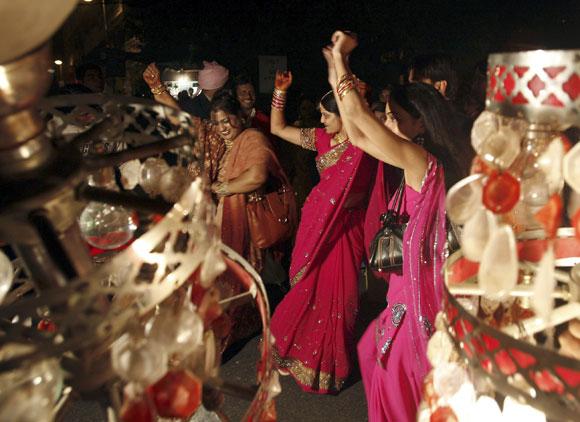
According to a Wall Street Journal report, on the night of November 27 at least 60,000 couples will be tying the knot in the romantic Delhi winter. As the long season of weddings gets underway, we find out just what this nuptial boom spells out for those in the business of marriage and others who're getting married.
A recent report in the Wall Street Journal predicted a record number of weddings that will take place in New Delhi on November 27. The report took 'a consensus of more than a dozen wedding planners and industry experts (who) estimated there would be no fewer than 60,000 marriages in the capital' on November 27 and about 1,00,000 marriages in the entire month.
While many of the wedding planners and venue organisers we spoke to argued that there just isn't enough place in Delhi to hold that many weddings in a single day, the fact is that the city has always hit the headlines for a record number of weddings.
According to one estimate, 36,000 couples got married on December 10, 2006. The WSJ report also says that on November 27, 2009, 40,000 couples tied the knot.
For a country that has some serious population issues, these numbers are bound to make some of us cringe. But for those in the wedding planning business, this is the time of the year they've been looking forward to most eagerly.
According to an estimate, the Indian wedding industry was worth a whopping Rs 190,000 crore in 2010 and is expected to grow 20 to 25 per cent annually.
Tanvir Sudan who runs an event management company says the months between November and February see an 80 per cent surge in demand for marriage-related services and products. This year, she says, has seen a 30 per cent rise in demand as compared to last year, although she adds that people are spending less on decor and more on jewellery and tangibles.
The matchmaking business is even bigger. In a recent interview with Rediff.com, Anupam Mittal, founder of Shaadi.com pegged the matchmaking industry alone at Rs 5,000 crore.
With inputs from Priyanka
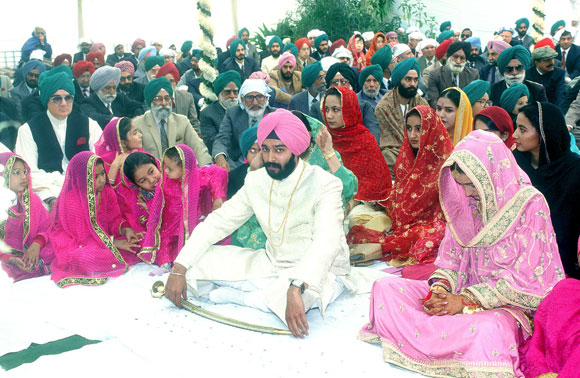
According to Nandita Sharma of Bollywoodshaadis.com, the average amount spent on a single Indian wedding is about Rs 15 lakh, which she points out is about 30 per cent more than the money spent on a wedding in the US.
Sharma also predicts that over 60,000 couples will be tying the knot on Sunday, November 27.
While more than a dozen-odd people we spoke to disagreed with Sharma -- at least three astrologers insisted that the first half of November 27 was inauspicious for a wedding -- they did concede that a large number of weddings are indeed taking place on that day.
Vipul Mishra who runs getyourvenues.com says that of the 44 wedding venues along the GT Karnal Road, at least 35 have been booked, but the real rush he says will be on Basant Panchmi (January 28), when all the venues will be booked and will cost you no less than Rs 2 lakh per day. This of course won't include the catering, the decoration, music or anything else for that matter.
Yet the month has been seeing excessive action on the marriage front.
According to Mishra, the venues in East and West Delhi on a 'normal wedding day' will charge you around Rs 1,200 to Rs 1,500 per person, with some strings attached. A deejay, for instance, will charge less than a live band or belly dancers.
But the 'more auspicious' the day, the more expensive will be your wedding, he warns.
When I asked a few astrologers which these 'more auspicious' days might be, their calculations threw up a handful of them -- November 18, 19, 21, 22, 28, 29 and 30 and December 1, 4 and 5.
Explaining the significance of the month, astrologer Mandar Ghaisas says, "Six moon signs -- Taurus, Gemini, Cancer, Leo, Virgo and Libra -- have fallen out of Saturn's influence on November 14. These signs fall under the rule of Venus and Moon, which ushers in a time of positive changes and matrimony for them."
He also points out that the Hindu month of Margashirsha, which is said to be the month of progress and prosperity, has already begun and November 27 is the first Sunday, which would explain the excitement around the day.
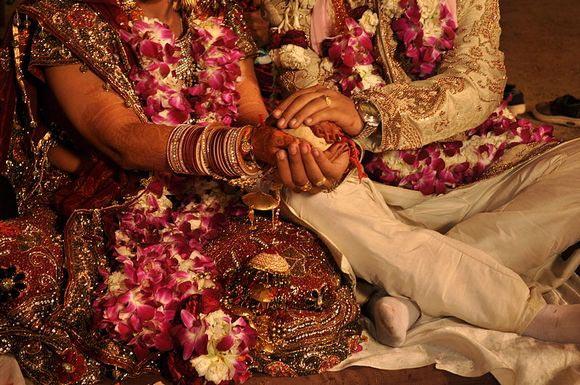
Not everyone agrees with Mandar Ghaisas. Astrologer Abhishek Dhawan points out that the auspicious time on November 27 will begin not before 11:12 pm and will go on till 3:45 am on November 28; Sundeep Kataria says it's a 'partially favourable' day and Aditya Vinay concludes that it'd be a very bad idea to get married on the day.
Meher Bharucha Sarid, a very prominent wedding planner who organised cricketer Gautam Gambhir's recent wedding, tells me that none of these dates mean a lot to most Sikhs who don't necessarily follow the Hindu calendar and get married on Sundays all year round.
Prashant Agarwal who runs a decorations and florist business in Delhi says that he's busiest on November 29.
"It just gets totally crazy around this time of the month," he tells me, in between giving instructions to his workers, adding that prices for everything tend to face a steep spike. "If a rose costs you Rs 5 on a normal day, during the wedding season it will cost you Rs 500!"
Needless to say, that is an exaggeration. When I ask him for a realistic figure, he sheepishly confesses that marrying on an auspicious day will cost you at least four times more.
"The flower decorations that would cost you Rs 10,000 off season would cost you about Rs 40,000," he says.
In a country of a billion and more is there any 'off-season' at all?
As it turns out, there is.
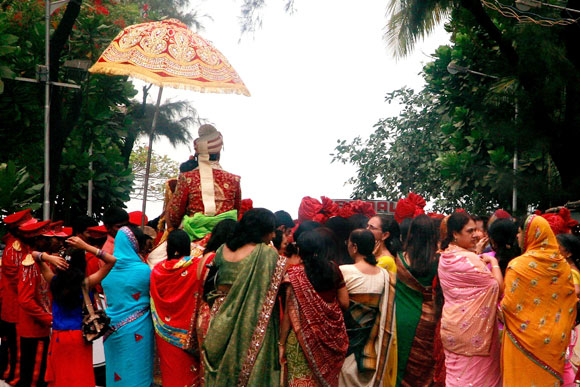
The Pitru Paksha, the fortnight that falls between September and October when the Hindus pray to their ancestors, is considered to be inauspicious.
Meher Sarid rattles off the yearlong wedding schedule.
"Hindus follow the shubh saaya (literally translated as 'auspicious shadow'). This begins around September. The period after Navratri generally sees a lot of auspicious wedding dates, which go on till early-mid December."
"Towards the end of December, there is a lull. Then the season begins again from the first week of January and goes on till early March and ends with Holi."
"There are spurts of wedding dates in April and June but July rarely sees any action. August is the month of engagements and the wedding season begins soon after," she says.
While this holds true in most parts of North India, in parts of Western India such as Maharashtra, the season peaks around the summer months of April and May. The Tamil Panchangam lists out at least half a dozen dates in March and almost as many in May and June.
In Mumbai, for instance November 27 is not slated to see a lot of action. The Parsi, Hindu and Wilson College Gymkhana grounds, which are the most high-profile wedding venues along Marine Drive in South Mumbai, are free on that day.
On the other hand, the South Indian state of Andhra Pradesh will be reeling under the pressure of over 50,000 weddings according to a Times of India news report.
While astrologers in Delhi say that the auspicious time on November 27 won't begin before 11 pm, those in Andra Pradesh believe that the only inauspicious time will be between 10:30 pm to 12:15 am.
According to the report, the Andhra astrologers believe that 'the day is devoid of any bad muhurtam'.
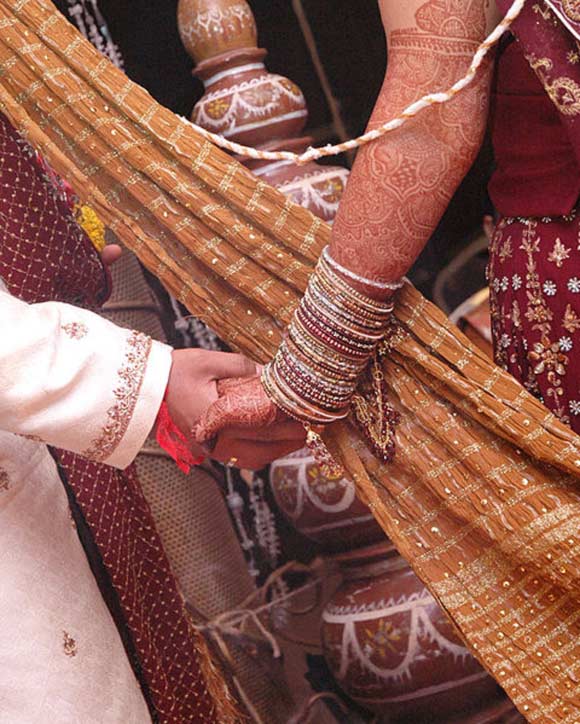
The rush to get married in Andhra Pradesh also has to do with the fact that there aren't a lot of auspicious dates after November 27.
Astrologer Ravi Kumar tells me over the phone that the planet Venus, which symbolises love and matrimony, is the brightest on the day. "Besides, all through next year, there aren't any strong wedding dates," he says, adding that he has 'a pile of wedding invitations' waiting for him in his office.
CVM Vamshi, who runs Eventina, a wedding events management company, is a little sceptical, however. He insists that while there may be a lot of weddings being hosted on November 27, perhaps 50,000 is a slightly exaggerated number.
He says that the Telangana issue is driving people to host weddings away from Hyderabad to cities such as Vijaywada, Visakhapatnam and Guntur, among other places. However he adds that the place to host the maximum number of weddings in the state will be Tirupati.
When I ask Sundeep Kataria why Mumbai may not see as many weddings on the day, he suggests that astrology also depends on location. "The cities are on different latitudes and longitudes," he points out.
His contemporary Aditya Vinay further suggests that it could probably be more a cultural thing than anything else.
"It's how festivals like Ganesh Chaturthi are celebrated widely in Maharasthra, but not so enthusiastically in Delhi," he says, adding, "Delhi and does not see as many weddings on the (auspicious day) of Akshay Tritiya, whereas it's a big day in Rajasthan."
Nonetheless, weddings in Delhi are a big deal. The very idea of the Big Fat Indian Wedding has its roots here, rather than anywhere else in the country. Large farmhouses, plenty of bling, copious amounts of alcohol and seemingly endless nights of partying to loud music -- you're less likely to get this heady combination anywhere else in the country.

Trains heading towards the capital are overbooked. An exasperated travel agent in Mumbai with a reputation for being able to book tickets at a short notice said it was impossible to get even a waitlisted seat on the trains.
In the city itself, infrastructure, patience and the cops are put to the test during this season each year.
According to Amit Jain, a Delhiite and a blogger on delhilive.com, the city has 'little over 100 banquet halls, 60-80 farmhouses, 220-250 community halls and 600 parks which can be used for wedding purposes'.
Vijay Garg, who runs Shubham Wedding Planners, estimated the approximate number of venues at about 3,000.
On November 27, 2003, according to a Telegraph report, police enforced laws that banned crowds, imposed restrictions and deployed additional traffic police officers to cope with 'a record 12,000 weddings'.
That record was broken long ago.
In November 2008, according to an IANS report, politicians had sleepless nights as the wedding season threatened voter turnout. Sheila Dikshit, the chief minister appealed to the citizens to 'take 10 minutes from their busy schedules and vote'.
Two years ago, in the same month, when over 40,000 couples got married on a single day, Jain exasperatedly wrote, "It appeared as if the entire Delhi crowd had got invitations for one or more marriages in the evening, and the number of cars rushing towards the favourite destinations of farm houses, banquet houses and hotels in different parts of the city were just too many."
He continued, "The four wheeler traffic on roads in the late evening hours was so much that even the recently inaugurated flyovers like Mukarba chowk on GT Road, signal-free Ring Road, Outer Ring Road with a makeover of new flyovers, NH8, Mehrauli-Gurgaon Road and so on were proving to be ineffective to accommodate the car rush."
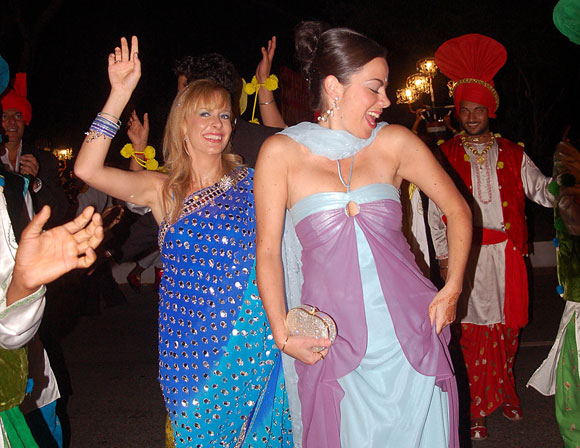
This year doesn't look very different. The Delhi Police is gearing up to the thousands of weddings, although it doesn't look like they're very worried.
Shri Paldan, Additional Commissioner of Police, Delhi Traffic Police told us, "The weddings and receptions usually converge on to the south and south-western areas of the Capital and the maximum rush is in and around the farmhouses located in Chattarpur and Mehrauli, both situated in South Delhi. We are planning to deploy at least 100 more traffic inspectors in each of the circles that come within these busy areas."
Yet, young brides and grooms would rather not settle for less auspicious alternative dates. According to Nandita Sharma of Bollywoodshaadis.com, around 70 per cent of Indians believe that marrying on an auspicious date will result in a successful marriage.
Meenakshi Wadhwa, who is getting married on November 29 is one such bride. Her parents set her up with Deepak Kapoor, who works with an MNC, about six months ago.
Wadhwa, who is a fashion designer by profession, believes marrying on an auspicious date will bring her good luck. "Everyone in my family gets married in the month of November," Wadhwa tells us, adding that she hopes to carry on the tradition.
"Besides," she adds, "the weather is great! Imagine getting married in the horrid, humid months of August, June or July!"
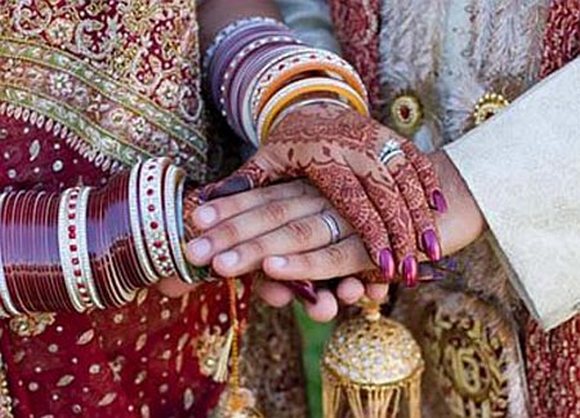
N K Dhanwntri, who is marrying off his 26-year-old son, also believes in the same theory, only he likes to veil the superstition in the garb of convenience.
"The date was mutually decided," he says, "(Sure) it is an auspicious date, but the children are just done with their exams, so it suits us well."
Dhanwantri's son Apoorva is set to get married on December 1.
Nitin Sharma, who plans to get married on November 28, is rather open about his beliefs, confessing that he is indeed superstitious about these things. He tells us that there were 'a few instances' in his family when marriages not performed on auspicious dates ran into 'some problems later on'.
Sharma does go on the defensive, though. "It isn't just me! The (bride's) side of the family also wants the date to be fixed by a pandit."
"I dont mind a change in the wedding date," Sharma tells us, "but the pandit has to agree. I don't mind getting married in any month, but it has to be an auspicious date."
And so, as temperatures dip to a pleasant low and stylish winterwear comes out of the closet, the Capital prepares itself to host yet another wedding season.
The groom sits atop an ostentatiously decorated horse that trots slowly, as the procession of guests dressed in loud saris and suits dance to the tunes of the latest Bollywood number being played by a brass band. Damn the traffic and the statistics, it's the season to get married.